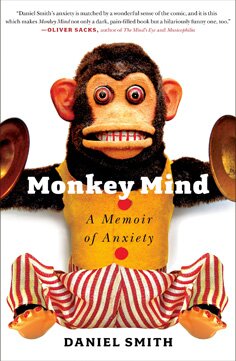Most Fridays, when I’m not too overwhelmed by work and life, I publish an exchange with my mother, Marilyn Smith — psychotherapist, anxiety expert, and genetic wellspring of my neuroses — about anxiety and anxiety disorders. Sometimes I forgo these exchanges and publish questions from readers, and my mom’s responses. If you have a question about anxiety you’d like me to share with my mother, please email me at [email protected].
Dear Mom: It’s been a couple of weeks at least since we’ve corresponded about my anxiety. You’ve been fielding other people’s questions, and haranguing them to breathe. Frankly, it’s been nice to have someone else be the target for a while. But I thought I’d chime back in here because I’ve been pretty anxious again and could use your advice. You see, I’ve decided to go back into therapy. Cognitive therapy, to be specific. And it’s freaking me out. I don’t mean the anxiety is freaking me out. I mean being in therapy is freaking me out. I’ve only been to two sessions so far, and already I’m spooked by … by what? By getting help, I think. Now why on earth would that be? Is it normal for anxious people to get more anxious because of the prospect of feeling better? Is this a common thing? If so, why? Also: hi. How are you? I know I owe you a call. Sorry. I’ve been slammed with work. Which is only making me more anxious. I think I might be getting an ulcer. Do you think I’m getting an ulcer? Do ulcers run in our family? Love, Dan
Dear Dan: Oy! No, ulcers don’t run in the family. Only cancer and heart disease! But if you’re having abdominal symptoms check it out. You could be the first! Lol! Hopefully it’s nothing but tension. Meanwhile, I’m delighted you started therapy and am not surprised it’s freaking you out. A fair number of people feel increased anxiety when they begin treatment. It’s quite normal and nothing to worry about. Worry is probably the reason you’re going in the first place — is that right? So my telling you not to worry is probably not helpful. Or maybe it is for the moment. You mention your anxiety has to do with the prospect of feeling better. Could you explain that? My experience is that anxious people coming into therapy worry that they’ll always feel the way they do when they start treatment — that they’re a hopeless, intractable case. They yearn to feel better although it may mean giving up the worry thoughts and behaviors that are so ingrained in their being. It may mean having to face situations they’ve avoided for years or the elimination of thoughts that seemingly protected them from some imagined catastrophe. I have no idea what’s in your head and frankly, I’m not sure I want to know. My advice is to discuss your concerns with your shrink! Love, Mom
You say you’re not sure you want to know what’s in my head. That makes two of us. As for discussing my concerns with my shrink, I will, but I don’t want to take up precious therapy time on my wormy, niggling meta-worries. This guy is super-expensive! He’s so expensive that I’m not even paying for the therapy myself: a dear friend has agreed to pay. Which makes me even more anxious, because now I worry that the therapy will take too long and this friend will have to pay oodles and oodles of money and come to resent me and regret that he ever offered to pay in the first place, even though I never asked him to pay — I never even hinted at it — and even though he has the money and insists that he doesn’t care about the cost and that I shouldn’t worry at all…. Whew! In any event, that’s why I’m bothering/exploiting you. You’re kind of like my supplementary therapist! And you’re free! Congratulations!… You said something very interesting in your response. You said that many patients yearn to feel better even though that might mean the elimination of thoughts that “seemingly protected them from some imagined catastrophe.” That’s what I’m wondering about. I’ve always thought of my anxiety as this shitty, jerky, patently destructive thing. But now I’m thinking that maybe, subconsciously, I’ve also always considered it a somewhat useful thing. I’ve been reading a book by this fancy-schmancy therapist of mine about worry, and like you, he says that a lot of chronic worriers have ambivalent feelings about giving up their worrying. The reason? Because (here he is addressing the reader) “your worry is a strategy that you think helps you.” By worrying, he writes, you are demonstrating a belief (again, not totally conscious) that “you will catch things before they get out of hand, get rid of any unpleasant emotion immediately, and solve all your problems. You think that following [your worrying habits] will make you feel secure.” But you learn over time that the worrying isn’t actually accomplishing any of these goals. So you go into therapy. But you’re still ambivalent! Does this ring true to you? Is this a way of thinking with which you’re familiar?
Wow… How lucky for you! This friend must really think you’re worth the investment. (I agree.) I bet he’s not worrying about the outcome. Maybe his generosity can serve as a great motivator for you to work hard in therapy — unless you screw it up by worrying too much about not getting better! Here’s the thing: Worry thoughts can be either useful or harmful depending on what you’re ruminating about and much time you spend on the thoughts. If you’re worrying about material you need for teaching your college class, that’s fine as it spurs you to do adequate preparation. But when you worry excessively about not performing well enough, anxiety can escalate and interfere with having the outcome you’re hoping for. But I don’t think I’ve answered your question. Your shrink writes that “your worry is a strategy that you think helps you.” I agree with that statement. For example, when you started driving, I worried constantly when you took the family car out. I pictured you crashing and splattered on the LIE, bleeding profusely. I felt powerless. The worry drove me nuts, but I was more afraid not to worry as the worry thoughts in a weird way seemed to protect you from danger. If I stopped worrying, then the imagined catastrophic fear might actually occur. In essence, worrying gave me some sense of control, however false. Does that make any sense to you? And by the way, who said my services are free. I expect periodic rewards, like sleepovers with my beautiful granddaughter!
That makes perfect sense. And doesn’t this make my run-of-the-mill anxiety kind of like obsessive-compulsive disorder? I mean, don’t people who suffer from OCD believe that by checking things, or counting in a certain sequence, or washing their hands a gazillion times, they will be able to prevent bad things from happening to themselves or people they love? And don’t they at the same time know that this is crazy? Just like you knew it was crazy to believe that by picturing my violent death (!) you would somehow be preventing my violent death. What nuttiness, to believe two things at once like that! What horror, to be trapped in such a conflict!
No, Dan, it’s not nutty and it’s not horrific. It’s kind of expected. Wait until your daughter starts to drive. See how you feel the first time she takes the car on a highway! It’s not as if I was consciously telling myself that if I worried about something bad happening to you then you’d be safe. There’s a difference between having normal worry thoughts during periods of high stress and having an anxiety disorder. I think you’re a little confused and it’s understandable since it’s difficult at times to distinguish between what’s normal and what’s not. I don’t think you have OCD. I think your worrying that you have OCD (if that’s in fact what you’re doing) is part and parcel of having generalized anxiety, even if you have some of the same symptoms as people with Obsessive Compulsive Disorder.







I can relate to all of this–having generalized anxiety disorder along with some ocd traits. If I don’t worry about something, it will probably happen. It is a form of keeping your guard up. I do find breathing and paxil help.